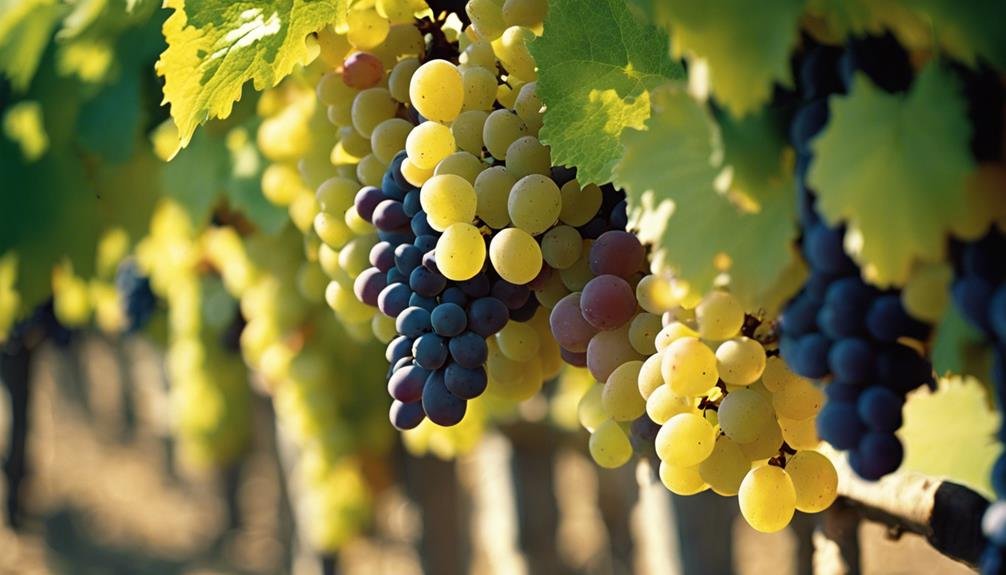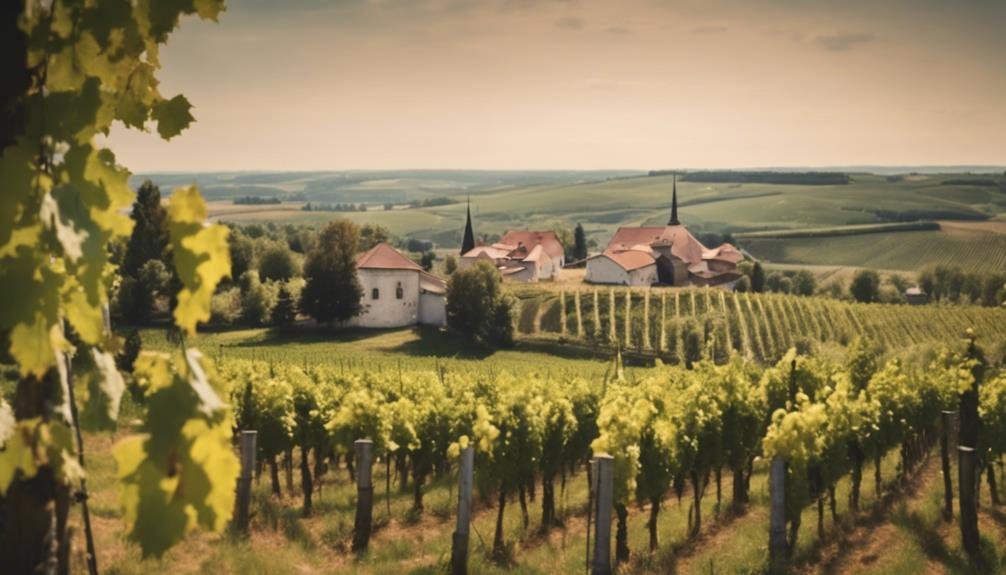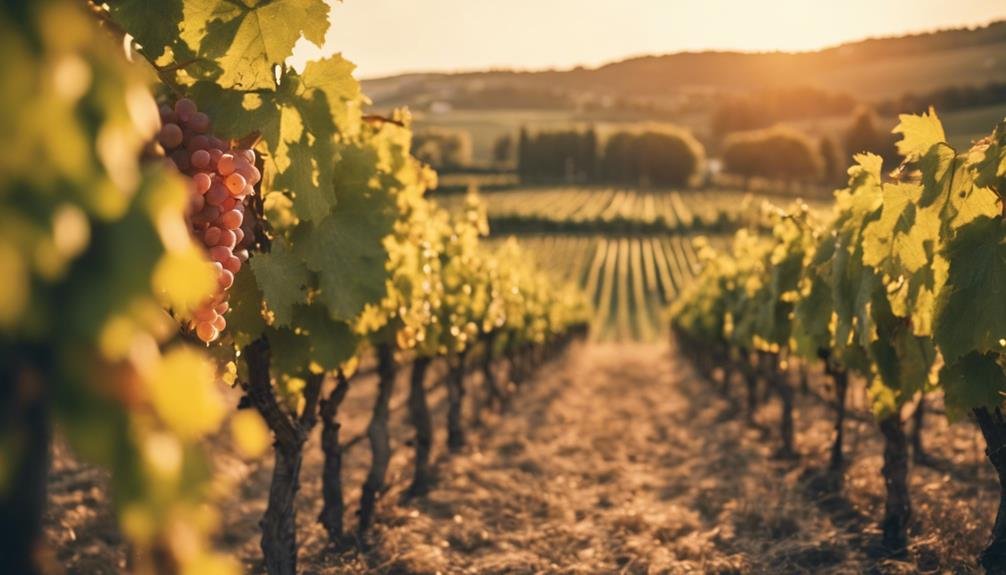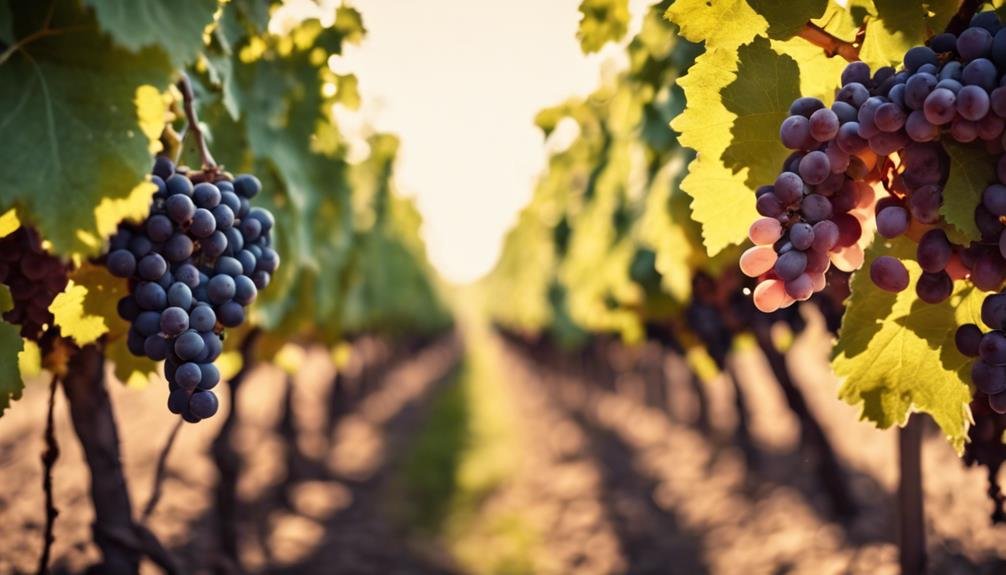Explore the fascinating history of Tokaji wine, originating from Hungary's unique climate. Crafted through ancient traditions, this sweet elixir showcases centuries of winemaking evolution. Production includes Botrytis-influenced grapes and meticulous blending techniques. Key grapes like Furmint lend a distinctive flavor profile to Tokaji. Evolving labels reflect tradition and quality standards. Modern trends emphasize sustainability and innovation, meeting consumer demands. Tokaji's revival highlights renewed interest in its unparalleled production methods. Discover more about this exquisite wine's rich heritage and promising future.
Origins of Tokaji Winemaking
The history of Tokaji winemaking traces back to a time when the unique climate conditions of the region in Hungary allowed for the development of the renowned sweet elixir known as Tokaji wine. Ancient traditions surrounding the production of Tokaji wines have been passed down through generations, emphasizing the historical significance of this exceptional beverage.
The region's ability to cultivate grapes affected by the noble rot, botrytis, has been a pivotal element in creating the distinct sweetness of Tokaji wines. Over the centuries, these winemaking practices have evolved, leading to the establishment of specific production techniques that continue to uphold the high standards of quality associated with Tokaji wines.
The legacy of Tokaji winemaking reflects a rich cultural heritage deeply intertwined with the art of crafting exceptional and unique wines.
Unique Production Techniques of Tokaji
With a focus on the distinctive methods employed in crafting Tokaji wines, the production techniques of this esteemed beverage showcase a blend of tradition and innovation.
The influence of Botrytis, a fruit fungus, on the grapes during the fermentation process is pivotal in creating the sweetness levels characteristic of Tokaji wines. As the mold develops on the grapes, it causes them to sweeten and shrivel, leading to unique flavor compounds like ginger and saffron.
The Aszú berries, affected by Botrytis, are carefully selected and added in specific quantities to non-Botrytis grape must, contributing to the rich sweetness and complexity of Tokaji wines. This meticulous process not only determines the sweetness levels but also enhances the aging potential of these exceptional wines.
The Grape Varieties of Tokaji

Exploring the diverse array of grape varieties utilized in Tokaji winemaking reveals the rich tapestry of flavors and characteristics that contribute to the unique profile of these esteemed wines. Grape genetics play an essential role in defining the distinctiveness of Tokaji wines, with varieties like Furmint, Hárslevelü, and Kövérszölö being central to their production.
Harvesting techniques are also vital, especially when collecting Aszú berries in baskets known as puttony, which are then added to grape must for winemaking. These grapes affected by botrytis mold bring sweetness and complexity to the final product.
The labeling of Tokaji wines, based on the number of Aszú baskets added to the must, further highlights the significance of grape varieties and harvesting methods in crafting these exceptional wines.
Evolution of Tokaji Wine Labels
Amidst the rich history and craftsmanship of Tokaji wines, the evolution of wine labels stands as a confirmation to the region's adaptation to modern standards and consumer preferences.
Tokaji wine labels have undergone changes driven by labeling regulations and historical significance. Over time, labeling regulations have been refined to reflect the quality and characteristics of Tokaji wines accurately.
The historical significance of the region plays an essential role in shaping the labeling traditions, with each label telling a story of tradition and excellence.
As Tokaji wines continue to gain global recognition, the evolution of wine labels remains an important aspect of ensuring transparency, authenticity, and adherence to quality standards, reflecting the rich heritage and innovation of the Tokaj region.
Modern Trends in Tokaji Winemaking

The evolution of Tokaji wine labels has paved the way for modern trends in Tokaji winemaking, reflecting a dynamic shift towards innovation and quality enhancement in the region's viticulture practices.
In response to consumer demand and environmental concerns, Tokaji winemakers are increasingly adopting sustainability practices and incorporating innovative technologies into their processes.
This dual focus on sustainability and innovation guarantees that Tokaji wines not only meet high-quality standards but also contribute positively to the environment.
Revival of Tokaji Wines
In recent years, a resurgence in interest and appreciation for Tokaji wines has been observed, signaling a promising revival for this historic Hungarian wine region. This sweet resurgence is a confirmation of the historical revival of Tokaji wines, once highly esteemed but facing challenges in recent times.
The renewed focus on Tokaji wines has brought attention to their unique production methods, including the essential role of botrytis mold in creating their signature sweetness. Additionally, the introduction of new regulations and categories for Tokaji wines has added a modern touch to this traditional winemaking region.
As dry single-varietal wines from Tokaj gain popularity, the future looks bright for Tokaji wines, blending heritage with innovation to cater to evolving consumer preferences.
Tokajis Promising Future

With a rich winemaking heritage and a renewed focus on quality, Tokaji wines are poised for a prosperous future in the global market.
Future Trends for Tokaji Wines:
- Increased Demand: The rising popularity of dry single-varietal wines like Furmint and Hárslevelü indicates a shift towards diverse offerings.
- Market Growth: Tokaji wines are gaining traction in European markets, showcasing the region's potential for expansion.
- Innovation in Aging: Utilizing local Hungarian oak for aging enhances the unique mineral profiles of Tokaji wines, catering to evolving consumer preferences.
Frequently Asked Questions
How Does the Botrytis Mold Affect the Flavor of Tokaji Wines?
The botrytis mold, a key element in the fermentation process of Tokaji wines, enhances their flavor profile by imparting rich sweetness and complex aromas. This impact contributes to the wines' unique taste and aging potential.
What Led to the Classification of Tokaj Vineyards in 1730?
The classification of Tokaj vineyards in 1730 was driven by the need to establish clear criteria for quality and origin, a pivotal moment in the history of Tokaji wine production. This historical event set the stage for future vineyard distinctions and quality standards.
What Are the Specific Sugar Level Requirements for Eszencia Wines?
Eszencia wines, characterized by their ethereal sweetness, require a minimum sugar level for production. Fermented from botrytis-affected Aszú berries, these exquisite wines showcase a unique flavor profile that reflects the rich winemaking evolution of Tokaj vineyards.
Why Are Dry Single-Varietal Wines Gaining Popularity in Tokaj?
Dry single-varietal wines are gaining popularity in Tokaj due to a shift towards drier styles in the wine market. Consumers seek diverse flavor profiles, favoring the crispness and complexity of these wines over the traditional sweet Tokaji varieties, reflecting evolving preferences.
How Has Tokajs Winemaking Tradition Evolved Since 1990 Privatization?
Since privatization in 1990, Tokaj's winemaking tradition has evolved by blending modern techniques with traditional methods. This fusion has enhanced quality, introducing dry single-varietal wines like Furmint and Hárslevelü, appealing to contemporary tastes while honoring heritage.
Conclusion
In the rich tapestry of history, Tokaji wine shines as a sweet elixir that has stood the test of time. Like a fine vintage, its story unfolds with complexity and depth, offering a timeless taste of tradition and innovation.
As Tokaji wines continue to evolve and adapt to modern trends, their promising future remains as bright and vibrant as the golden hues of a perfectly aged glass.
Enter the world of Tokaji, where history and flavor intertwine in a mesmerizing blend.
